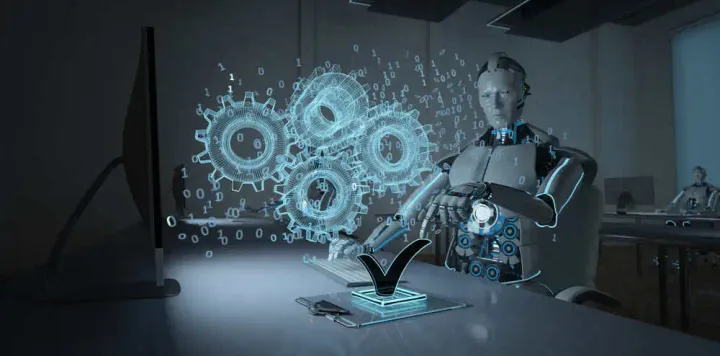How AI Is Revolutionizing the Nonprofit Sector
AI revolutionizes the nonprofit sector by streamlining operations, enhancing fundraising strategies, and personalizing donor interactions. From AI-powered donation platforms to automated content verification tools, nonprofits can use technology to improve efficiency and engagement.

Artificial intelligence is transforming the way nonprofits operate. And it's not only about nonprofits but also the entire business sector. In fact, experts predict that the worldwide AI market might hit 826.70 billion by the year 2030.
AI, previously exclusive to large tech industries, is now transforming the operations of nonprofits. It has influenced their working mechanism, fundraising methods and donor interactions. By accelerating routine tasks and personalizing donor communication, AI's impact on the nonprofit sector is substantial.
In this article, we will examine the transformations AI is bringing to nonprofit organizations. Let's get into it!
Utilizing AI Detection Tools for Nonprofits
One way AI is making waves in the nonprofit world is through AI detection tools, particularly content production and dissemination. Nonprofits produce large volumes of written material for blogs, newsletters, grant proposals, or social media outreach, and as such, the quality, originality, and credibility of this writing must be upheld by their supporters and stakeholders. AI detection tools such as Smodin, have emerged as invaluable assets during this process.
The trusted AI detector by Smodin is used to detect plagiarism or ensure human-content originality, helping nonprofits maintain the integrity of their communications. Nonprofits regularly share reports, studies, and educational materials with their audience, and using AI detection tools ensures that the content they share is human-written, well-researched, and checked, before being sent to the public.
AI detection tools can also assist nonprofits in staying ahead of potential disinformation campaigns. For example, nonprofits advocating for social or policy reform are vulnerable to spreading false information that may cause a boom at the beginning, but once the public finds out the truth, the only thing hit by the explosion will be their reputation. So, using AI-powered fact-checking tools helps verify the accuracy of any data being shared, thereby maintaining credibility among donors and the general population as well.
Make Use of AI-Powered Donation Platforms
The first use case of AI for nonprofits is in the form of donation platforms. They are revolutionizing how nonprofits manage contributions by simplifying donation procedures and increasing donor engagement. These platforms use machine learning to suggest personalized donation amounts, identify optimal times to launch campaigns and automate appreciation messages.
By monitoring donor actions, AI tools can spot patterns, reconnect past supporters, and tailor campaigns to what donors prefer. When donors get more involved, this method boosts fundraising success, builds stronger ties, and allows easy gifts through simple online interfaces for one-time or monthly donations. AI-based systems also work well with CRMs and other tools, giving nonprofits up-to-date insights to make smart choices and improve fundraising outcomes.
Offering Personalization and Customer Support
Personalization is another hallmark of AI-powered fundraising. AI tools allow nonprofits to segment donors based on interactions, donation amounts, and interests, enabling highly tailored communication and outreach strategies. AI campaigns automate personalized email communications, sending customized messages like thank-you notes. This makes donors feel appreciated and more connected to the cause.
AI chatbots help donors by giving quick, round-the-clock help. These bots swiftly reply to what donors ask, guide them through online gifts, and recommend ways to give based on past donations. They offer tailored advice to make giving easy and keep donors happy.
Enhancing Operational Efficiency with AI Automation
AI can assist nonprofits in improving operational efficiencies through automation. Since nonprofits typically have limited staff and resources available for managing tasks manually, finding ways to automate routine processes can be transformative.
Nonprofit organizations frequently rely on AI-powered customer relationship management systems to manage donor information efficiently, saving staff time while guaranteeing data is always correct, as well as eliminating human errors from data management processes. Such automation ensures nonprofits maintain an in-depth view of their donor base at all times.
AI can also streamline social media management for nonprofit organizations. Utilizing AI-powered platforms, nonprofits can schedule posts, monitor engagement rates, and analyze which content resonates best with their audience. This leaves more time for creating engaging posts instead of managing multiple social accounts manually.

Enhancing Program Delivery and Measuring Impact
Many nonprofits have a hard time evaluating whether their programs work and telling donors and stakeholders about it. AI tools offer groups clues on how their programs are performing and point out where they might enhance them.
AI can help nonprofits analyze large datasets like survey responses, social media interactions, or public health data more accurately by quickly spotting trends or patterns. This allows nonprofits to make data-driven decisions, regarding where resources should be allocated and which programs have had the biggest impact.
AI can improve program delivery beyond data analysis by offering new ways of engaging beneficiaries and meeting them directly. For instance, using mobile applications fueled by AI to deliver educational material, mental health services, or financial literacy training directly to those in need. Nonprofits use these tools to reach larger audiences, particularly remote or underserved areas, and deliver services more quickly and flexibly than before.
Exploring Ethical Considerations in AI Use
As nonprofits increasingly adopt artificial intelligence, they must recognize and address any ethical considerations involved. AI may offer many advantages, but its introduction can raise concerns about privacy, bias, and job displacement. Because of this, nonprofits must ensure any implementation aligns with their ethical standards and values.
One major consideration facing nonprofits is data privacy. Nonprofits gather sensitive information about donors, beneficiaries, and the communities they serve, while AI systems need substantial amounts of data to operate effectively. Therefore, strong data protection policies must be put in place for nonprofits to secure this sensitive data while assuring its use responsibly.
AI algorithms can reinforce bias if they are trained on datasets that reflect specific demographic prejudices. For instance, employing donor outreach AI tools trained on such data may unintentionally favor certain groups over others. Nonprofits must carefully oversee these tools to ensure fairness and inclusivity.
Bottom Line
AI is clearly altering the nonprofit scene, bringing new opportunities to work smarter, tailor efforts, and make a bigger difference. From using AI tools to check content to applying AI-driven digital fundraising tactics, nonprofits are constantly on the lookout for new methods to boost their work and better help their communities.
Even so, as they embrace these new tools, nonprofits must keep their values and ethics at the forefront. They need to make sure AI fits with these ideals. As AI grows, it holds a lot of promise to help nonprofits reach their goals and bring about real social change.


